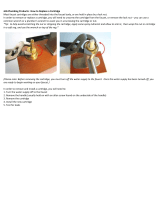
IMPORTANT FAUCET INSTALLATION NOTICE
Before using a newly installed faucet, remove the aerator, if applicable. Turn on the water to the faucet and
let it flow for 15 seconds. This flushes out sediment in the water line, preventing it from becoming lodged in
the faucet valves, which can affect performance and cause damage to the faucet.
5. Turn on the hot and cold faucet taps to release any
pressure and excess water. Turn off.
6. With a wrench, remove water lines underneath the
faucet, placing the ends in a bucket.
7. Open the shut-off valve or water main and let water
flow into the bucket for 15 seconds.
8. Close the shut-off valve or main supply, then reattach
the water lines to the faucet.
9. Reopen the valves to restore water to the faucet and
check for leaks.
FLUSHING WATER LINES
1. Place a towel at the base of the faucet and remove the
faucet aerator. If using pliers, place a rag around the
aerator to protect the finish.
2. Turn on the cold and hot water, letting the faucet run
for 10-15 seconds.
3. Rinse out the aerator, carefully noting the placement of
washers inside. Replace the aerator and check water
flow. If there is no improvement, continue to Step 4.
4. Close the shut-off valves or turn off your home's water
main, twisting the valves clockwise as far as possible.
If your faucet has an uneven flow or is dripping, it may be due to a buildup of sediment. Follow these steps
to restore normal water flow. If your faucet does not have an aerator, proceed to step 4.
What You'll Need: Open-ended wrench, large bucket, pliers, towel, rag.




